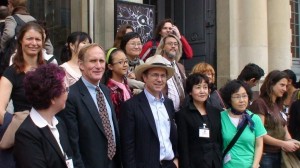On the face of it, science hasn’t had much of a look-in during the protracted presidential debates that have played out between Barack Obama and John McCain in the last few weeks.
But listen closely and you’ll find that when talk of the economy doesn’t dominate, science-driven issues do, including the pressing desire on the part of the Americans to be more self-sufficient when it comes to energy and to regain their title as the most innovative country in the world.
The latter is the subject of much hand-wringing among US scientists and technology entrepreneurs who remember the glory days of the US, when Bell Labs pumped out the patents, Silicon Valley dominated technology and John F Kennedy in 1961 boldly pledged to put a man on the moon “within the decade”. He got there with time to spare, even if he sadly wasn’t around to see the great event.
The frustration in the scientific community, exacerbated by what critics see as eight years of regressive science policy from the Bush administration, has led more scientists to openly wear their political colours on their lab coats. Witness the 61 Nobel Laureates who have given their endorsement to Barack Obama. In this open letter to the “American people” they state that:
“Senator Obama understands that Presidential leadership and federal investments in science and technology are crucial elements in successful governance of the world’s leading country. We hope you will join us as we work together to ensure his election in November.”

That’s about as partisan as it gets for scientists. Among those signing that open letter were molecular biologist Peter Agre and theoretical physicist Frank Wilczek, two brilliant scientists I had the pleasure of meeting in June in Stockholm at the Royal Swedish Academy of Sciences – the body that each year dishes out the Nobel prizes.
Over a lunch hosted by the mayor of Stockholm, Agre talked to me openly about the race for the presidency and his views on what path would be best for the country.
On stem cell research, science education and the defining issue of climate change, Obama and McCain are, broadly speaking, on the same page. But their strategies for tackling climate change nevertheless differ markedly given the massive job tackling climate change will entail. Which makes things less clear-cut for those scientists still in the undecided camp three weeks out from the election.
Meanwhile, here in New Zealand it’s rare to see a single scientist publicly endorse a political candidate, let alone a phalanx of the country’s leading minds. Why is that? Apathy? Fear of discrimination if they back the wrong horse? Or is it just that New Zealand’s scientists would rather keep their heads down and focus on research rather than polls?